A lasting legacy Dame Margaret Barbour Empowering change
Dr Olusola Idowu New beginnings Mike O'Brien

spring 25

A lasting legacy Dame Margaret Barbour Empowering change
Dr Olusola Idowu New beginnings Mike O'Brien

spring 25
NESTLED WITHIN A PRIVATE ESTATE IN THE NORTHUMBERLAND COUNTRYSIDE
YOU WILL FIND ALL THREE OF OUR MAGNIFICENT EVENT VENUES

THE HALL WITH IT ALL THE BARN THAT BREAKS THE MOULD DRINK, DINE & DREAM
Grade II listed hall
Six eclectic bedrooms in the hall
Up to 160 guest capacity
Team building days, corporate retreats, small meeting spaces & private parties



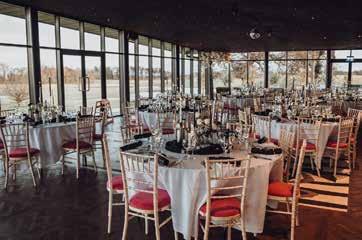
Rustic barn venue on private 550-acre country estate
Onsite cottage accommodation
Up to 250 guest capacity
Large corporate parties, festivals, conferences, award ceremonies & charity dinners




41 sumptuous bedrooms, suites & cabins
Bar & The Orangery restaurant
Tipi at The Tempus with up to 100 guest capacity
Bespoke celebration events, dining experiences, wellness retreats & networking events
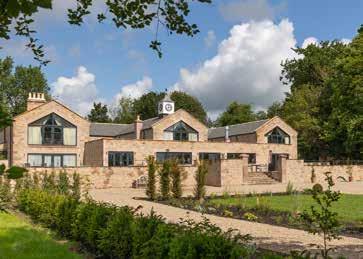



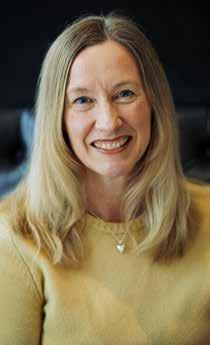
Recently, I was fortunate enough to listen to Simon Arora speak. He is the entrepreneur behind B&M who bought their 25 shops for £525k, growing the business into a £5 billion retailing empire. He gave an analogy about ice hockey which resonated with me. He said, “skate to where the puck is going, not to where the puck is.” As entrepreneurs, we need to look down the rink and predict where the puck is headed and make sure our businesses are ready.
This is important advice, in a rapidly changing world where we need to be progressive, just to keep in the game. Progressive companies don’t fail –they either win, or they learn. I’ve heard of ‘failure brags’ being built into businesses to help promote a culture of innovation. These ’brags’ are presented by team members who build case studies of what they’ve learned from projects that didn’t exactly go to plan. The point is to showcase the lessons gleaned from innovation and highlight how they are being incorporated back into the business. The company then votes for the best ‘failure brag’, rewarding those who learn and improve the business as they innovate. This is why, at the Entrepreneurs’ Forum, we place so much emphasis on building a growth mindset. To nurture your mindset, you must believe that your skills can always be improved and developed through continuous learning, including proactively seeking and acting on feedback. You must also acknowledge that nearly everyone (including yourself!) has a fixed mindset at least some of the time. Humans are pre-programmed to have fixed mindsets and when we are tired
or stressed, it’s normal to default back into this behaviour. Awareness of the triggers of fixed mindsets is something you can learn. For example, I find receiving criticism hard, and I naturally become defensive. This is a trigger for me, I'm now aware of, so I am working hard to turn this into a learning opportunity.
Our community is designed to provide you with opportunities to continuously learn and challenge yourself. This comes by getting involved, asking questions and seeking feedback. All entrepreneurs wrestle with tough times and the Forum provides a safe space to ask for help - either from the people you meet at our events or through our bespoke mentoring service. You may even learn something new by reading this edition of Forum magazine.

Elaine Stroud Chief Executive
proud to be partnered with

Progressive companies don’t fail - they either win, or they learn.
The Entrepreneurs' Forum is a membership organisation for North East entrepreneurs who run businesses that turnover more than £250,000 per annum. Membership is for the owner, not just the business because we know that entrepreneurship is a life choice that only other founders can truly understand. At the Forum you'll surround yourself with friends, collaborators and mentors who can offer you guidance, support and inspiration at every stage of your business.
To find our more about what we do and how to join visitentrepreneursforum.net/ get-involved
Forum is published by Allies Group Ltd
Allies Group Ltd, The Schoolhouse, 12 Trinity Chare, Quayside, Newcastle Upon Tyne, NE1 3DF allies-group.com
Editorial
Stacey Crowther stacey@entrepreneursforum.net
Amy Mason amy@entrepreneursforum.net
Nicole Wood nicole@allies-group.com
Simon Rushworth simon@allies-group.com
Advertising
Debi Coldwell debi@allies-group.com
Design studio@allies-group.com
To amend your mailing address, or to add/remove yourself email info@entrepreneursforum.net
From inspiring gatherings to thought-provoking discussions, mark your calendars because we’ve got an exciting programme of events designed to spark fresh ideas, foster meaningful connections and help you rekindle your passion for business.
Our events are only open to Forum members and while we've listed a selection of the 70+ events we'll host this year below, for our complete calendar, and to register, please visit our website - entrepreneursforum.net/events

New Member Meet and Greet Online, Teams
Thursday 1 May, 11am - 11.30am
If you’re new to the Forum, join us on Teams for our next ‘New Member Meet and Greet’ session where you'll get to know some fellow members - we're all here to support each other through the ups and downs of business.
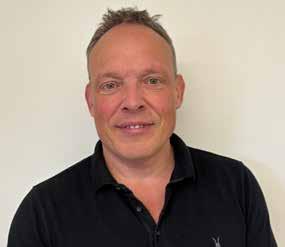
Round Table: Cutting Costs from Your Business
Agilico, Gateshead
Thursday 8 May, 9.30am - 11.30am
Join us for a dynamic discussion as we explore the critical topic of cost management led by David Lewis of Collectables.

Social Event: Member Lunch
The Botanist, Sunderland
Friday 9 May, 12.30pm - 2.30pm
Exclusively for our entrepreneur members, join us for lunch at The Botanist. Get ready for delicious food, wonderful company and engaging conversations.
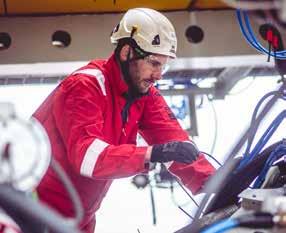
On-site: OSBIT
Port of Blyth, Blyth
Wednesday 4 June, 9.30am - 11.30am
Join our Chairman and co-founder of OSBIT, Brendon Hayward, on a behind-the-scenes tour of one of the most cutting edge engineering firms in the North East.
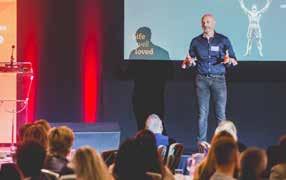
Spring Conference
Hardwick Hall, Sedgefield
Thursday 22 May, 8am – 3pm
Our reimagined spring conference promises to be a vibrant day that will energise, uplift and inspire our members like never before. So, step away from your business and immerse yourself in the North East’s largest gathering of entrepreneurs, for entrepreneurs.


Focus Dinner: Ben Ridgway and Jamie Cooke
21, Newcastle
Thursday 5 June, 6pm - 10pm
Don’t miss this chance to hear from the visionaries behind iamproperty and gain invaluable takeaways for your own business journey.

Spotlight: Building a Senior Leadership Team
NUCASTLE, Newcastle
Thursday 19 June, 9.30am - 11.30am
Join Andrew Walton of Connect Health and host Simon West of Blair West for an intimate fireside chat exploring the art of building exceptional senior leadership teams that drive business success.

Focus Dinner: Mike Racz
Middleton Lodge, Richmond
Wednesday 25 June, 6pm - 10pm
Join our exclusive dinner with powerhouse entrepreneur Mike Racz as he shares how he scaled to over 100 franchises and a 2,000 strong team.

Round Table: Building a Sales Team
Agilico, Gateshead
Tuesday 1 July, 9.30am - 11.30am
Join us for an insightful round table discussion on the key elements of building a high-performing sales function, led by Mark Bryce of Agilico.
Our year-round events calendar is designed to inspire, connect and support entrepreneurs navigating the opportunities and challenges of running a business. Below you’ll find a description of the type of events we offer, along with what to expect from each one.
Marking the launch of our annual events calendar, our Chair is joined by an inspiring and leading entrepreneur or business figure to host our Chairman’s Dinner
£99+VAT (for all categories of members and partners)
As the North East’s largest gatherings of entrepreneurs, our annual conferences bring top-class speakers to the region from some of the most successful and innovative organisations in the world.
£150+VAT per person (for all categories of members and partners)
Our annual Entrepreneurial Awards acknowledge the achievements of the region’s most talented and successful entrepreneurs in an evening of celebration and fun.
From £120+VAT per person or £1200+VAT for a table seating ten (open to all in the North East business community)
Our entrepreneur-only focus dinners give you the opportunity to hear stories from trailblazing entrepreneurs that you won’t hear anywhere else. Connect with like-minded entrepreneurs over great food and unfiltered, honest conversations.
£90+VAT (for entrepreneurial members only)
Every quarter, we host a new member online meet and greet session. There is no agenda, just a chance to get to know each other and the Forum team a little better.
FREE (for entrepreneurial members only)
On-site visits are full of helpful ideas to implement in your own business, giving you an exclusive behind-the-scenes tour of some of our region’s most creative and innovative organisations.
FREE (for entrepreneurial members and lead corporate partners only)
Our round tables provide a confidential space for candid discussions, where newer business owners connect with experienced entrepreneurs to share insights, tackle challenges and gain valuable knowledge.
FREE (for entrepreneurial members and lead corporate partners only)
If you’re looking to recharge your batteries, our social events are fun-filled ways to build authentic friendships - whether it’s over lunch, at a sporting event or an evening out.
Costs may occur (for entrepreneurial members only)
Looking for insights and inspiration? Our spotlight events offer opportunities to hear real, lived experiences of scaling, surviving and sustaining the business journey from fellow entrepreneurs.
FREE (for all categories of members and partners)
Expert-led workshops combine thoughtprovoking talks and interactive sessions to help you and your senior leadership team learn the skills and insights needed to move your business forward.
FREE (for all categories of members and partners)
Want to attend one of our events but not yet a member? Head to our website to find out more or scan the QR code to explore the different options available.
Membership starts from as little as £52 + VAT per month. We’d love to welcome and introduce you to the largest community of entrepreneurs in the North East.
Here we shine a spotlight on the entrepreneurs who have joined our membership lately, we’re so excited to have you as part of our community.

Tell us about yourself
I’m a mum of two young children, wife to an avid triathlete and Chief Executive of Magnitude Biosciences. We moved to the North East almost seven years ago and never looked back. It's a wonderful place to live and raise a family.
I’m a scientist by training but knew early on in my PhD that I wasn’t content just doing fundamental scientific research, I needed to see the application of my research into real world use.
I’m passionate about female empowerment and advocacy, so I’m also Vice-Chair of The Lifted Project-Newcastle Board. Despite there being a high number of female entrepreneurs in the region the step-up to high growth is still too low, but the stats show that female led businesses generate a better return on investment.
Why did you decide to join the Forum?
I’m at a stage in my career where I want to branch out and want to be more involved in the wider North East business community. I’d like to learn about leadership challenges across different sectors and understand how I could embed those lessons into my business.
What do you enjoy most about running your own business?
Working with the brilliant team I’ve created at Magnitude is my favourite place to be! Sitting in a room brainstorming innovative ideas for growth and innovation and then watching them come to life.
What is something most people don’t know about you?
I originally wanted to study medicine, it didn’t look like I’d get the grades in sixth form so I applied to study biomedical science instead. Everything happens for a reason though, as I wouldn’t have met my husband or been running a company had I gone down the medicine route.
What would you be doing if you weren’t running your current business?
Gosh, not sure. I would probably have remained working in a big corporate job in London. I think our move to Newcastle really prompted me to think differently about what my working life could look like and make this move into running a business.
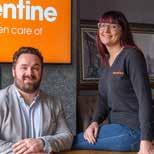
Tell us about yourselves
Mark: Clementine is a family business on an exciting journey; we’re using modern tech and AI to dramatically improve an age-old industry – plumbing, electrics and trade services. Myself and Kerry run the business, supported by a great team of tradespeople, contact centre staff and admin. It’s a real team effort and we’ve got talented people doing great things.
Why did you decide to join the Forum?
Kerry: We were previously members a while ago and recently attended some events as it felt like the right time to re-engage and join the growing North East entrepreneurial community. The Forum does great work and is a fantastic resource for local business. What do you enjoy most about running your own business?
Kerry: That every day is different; it’s a challenge in one sense and an exploration in another, which leads to interesting places. Being in a close team is a great experience, we’ve got a tight-knit culture and really try to support each other. That’s one of the best aspects, certainly.
What is something most people don’t know about you?
Mark: In my younger years I was a former British Ju-Jitsu ground fighting champion, which was a precursor to what eventually has become the MMA movement that has exploded over the last decade or so. It was many moons ago... I’m very happily and permanently retired.
What was your first job?
Mark: I got a job at 14 as a video editor for a local rugby club; cutting the videos into line-outs and scrums so the management team could analyse their performance. My first proper job however was at Dickens in Shiremoor, on the hardware section. It was an early first-hand experience of how much demand there is for good tradespeople and trade knowledge.
What are you most proud of?
Kerry: Our kids are fantastically rounded people, so we're very proud of them. We're proud of the team and their achievements. We constantly try to develop our people, and seeing them make improvements in work and as individuals is heartwarming.

Tell us about yourself Hi, I'm Chris Wood, CEO of Tanglewood Games. I started the company eight years ago after working for 15 years as a games programmer. I've only recently started to think of myself as an entrepreneur as I never thought I was the right type of person, but I think that's because I didn't understand what it meant. I've always been a creative problem solver but now I solve problems for my business instead of in code.
Why did you decide to join the Forum?
Apparently my business partner, Terence Burns, recommended I join earlier last year. He reminded me of this, when I did so, recently. I refer you to my previous answer... I never really considered myself an entrepreneur. I must have ignored him. Fast forward, and a LinkedIn post about the Chairman's Dinner jumped out at me. A chance to meet like-minded people - perfect. What do you enjoy most about running your own business?
The freedom can't be understated. "Being your own boss" is a cliché that fails to capture it. Unlike most games studios we are fully independent. We have no debt or investors. We are answerable to no one but ourselves. It's scary but it is the best thing I've ever done.
What was your first job?
Technically my first job was servicing cars in my parent's garage. My first "proper" job was as a programmer for the Royal Navy. Fun fact, they forgot to get me to sign the Official Secrets Act on my first day, which we discovered on my last day and fudged the signatures. I'm not sure I'm allowed to tell you that, or what I did there.
What would you be doing if you weren’t running your current business?
I'd probably be a reasonably successful games programmer with very little management responsibility or decision-making freedom. What are you most proud of?
Creating something from nothing and believing, despite the challenges, that I could do it. Then sticking to it for years. That and my Driver of the Day Award from a charity karting event in 2023! I got it for wearing sunglasses under my helmet all day. I'll take it!
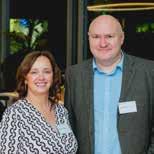
Tell us about yourselves
We’re Ann-Marie and Mark, co-founders and husband and wife.
Mark has a wealth of experience in IT, having worked for many large organisations, and is a developer at heart. He has a degree in Maths and started his IT career with the Electronic Data Systems (EDS), where he worked on defence projects. Ann-Marie’s background is in customer service and account management, with a degree in Business Studies. She got her start working in a famous 5-star hotel, where she learned the importance of hospitality and putting people first — skills that she still uses in our business today. Together, we complement each other’s skills perfectly. We’ve been working full-time together since the company pivoted almost three years ago, and it’s been an incredible journey. What do you enjoy most about running your own business?
What we love most is the freedom and control it gives us to create something meaningful and make an impact. We’re both driven by the idea of problem-solving — whether it’s in IT or customer experience — and it’s incredibly satisfying to see our hard work directly benefit our clients. What was your first job?
Mark’s first job was with EDS working on a UK defence project. Mark has always been in tech. In the 1990s he used to run a Bulletin Board called “Emerald City BBS” in the Teesside area! AnnMarie’s first job was in a 5-star hotel, where she learned the art of hospitality and the importance of putting people first.
What would you be doing if you weren’t running your current business?
If we weren’t running our business, we’d still be involved in the tech and customer service industries in some capacity. Mark is so into tech and development that he’d have some venture or business on the go. Ann-Marie could see herself working in a more strategic customer relations role. But honestly, after making the leap into entrepreneurship, it’s hard to imagine doing anything else!
What are you most proud of?
We’re most proud of how much we’ve achieved together in the last few years. Pivoting our business and growing it from the ground up has been challenging, but incredibly rewarding. We’re particularly proud of our commitment to growing the local developer community in the North East and offering opportunities to young people through work placements.

Tell us about yourself I am the director of the Big Purple Group. We are a family run business founded in 2013 housing four companies. Big Purple Productions, specialists in audiovisual and production management, Big Purple Capture, experts in video production, editing and photography for both live, hybrid or virtual events, Big Purple Events, offering bespoke props and room dressing and Big Mic Ball, a patented throw-able microphone ball used by a world renowned broadcaster at major events. Why did you decide to join the Forum?
With significant growth these past two years I thought it best to surround myself with other entrepreneurs who I could ask for guidance and use their expertise and their journey to help better mine.
What do you enjoy most about running your own business?
The most enjoyable part is the creativity and freedom to shape things the way I want. It’s amazing to see an idea grow into something real and to make decisions that directly impact the business's direction and success.
What is something most people don’t know about you?
I am an avid video gamer which has helped our business break into the esports world.
What would you be doing if you weren’t running your current business?
I would probably still be freelance travelling the world working on exciting projects.
What are you most proud of?
I am so proud of how far the business has come. From one company to four companies has been amazing, to have the clientele we have and be recognised in our industry worldwide feels unreal.
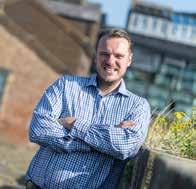
Tell us about yourself
I’m Austin Gibbons, the Founder of Brighter Compliance. Having a background in compliance environments such as facilities management and safety led me to realise the opportunity of driving compliance in organisations leading to positive outcomes. Having a degree in business and a Masters in Facilities Management, I recognise the importance of compliance while achieving efficiencies in performance delivery. Outside of the world of compliance, I enjoy
spending time with my two year old son Noah and partner Laura. My time typically consists of walks along the beach with my dog in Whitley Bay or at soft plays haha.
Why did you decide to join the Forum?
I kept hearing great things and thought I’d love to be able to discuss business opportunities and struggles with fellow entrepreneurs in the North East.
What do you enjoy most about running your own business?
I enjoy watching my team develop. Within the team many hadn’t previously worked around compliance, they have come in and embraced a lot of learning and now are thriving — supporting clients to improve.
What is something most people don’t know about you?
I hold a black belt in karate.
What was your first job?
Working at Manchester United as a cleaner. What would you be doing if you weren’t running your current business?
Working for a facilities management company managing estates and compliance.
What are you most proud of?
Working alongside my co-founder of my other business Simply Certification. This is the fastest growing certification body around retrofit and renewables.
More new members who have joined prior to 1st April
Liam Monte 3Dental
Grzegorz Majerski & Aneta Majerska AG Controls
Niall Ash Ashgarth Engineering
Paul Westgarth Ashgarth Engineering
David Broom B7
Ali & Rob Boville BearTech Dev
Will Halford Boniplas
Shawn Bone Cavu Corporate Finance
Tomas Roberton Circle Cloud
Michael Povey Circle Cloud
Grahame Chapman Cleaning and Support Services
Derek Scott Consultive Solutions
Kate Cooper-Fay Cooper-Fay Harris
Kieron Goldsborough Different Narrative
Integrated Marketing
Michael van Zwanenberg DME Systems
Peter Fairley Fairley Gunn Group
Paul Reade Francis Bradshaw Consulting
Bob Evans Insight Finance Directors
Craig Hawkes Kaleidoscope CFA
Richard Coates Lumanorth
Derek Lister Nicander
Aqib Zeeshan Platvix
Victoria Taylor Probe Industries
Helmut Okike Quovoy
Sharon Starkey Resolution Communications
Grant Henderson Shorza
Shaun Hogg Vove
Want to see your name here?
Head to our website to find out how to become a member.

Forum Lifetime Achievement Award in 2020 and the British Fashion Council Special Recognition Award in 2024. As she reflects on her journey, she remains deeply committed to the values that have defined Barbour’s legacy.
“It has been exciting to see how the brand has grown from its small roots selling oilskins to mariners in South Shields into the trusted global lifestyle brand it is today,” says Dame Margaret. Despite its evolution, Barbour’s founding principlesquality, durability, attention to detail, and fitness for purpose - remain at its core. “Our products are inspired by the British countryside and are timeless, stylish, and functional, designed for our customers to wear in their own individual way.”
One of the key reasons Barbour has stood the test of time is its universal appeal. “Barbour appeals to many different customers and generations,” she explains. “They wear our brand for many reasons - from working in the country to walking down the streets of Manhattan.” By offering collections that blend heritage with contemporary fashion, including collaborations with the likes of Alexa Chung, Ganni, Erdem, and Paul Smith, Barbour continues to resonate with a wide audience.
Forum sits down with Dame Margaret Barbour to discuss her journey in leading an iconic British brand, her commitment to sustainability, and how giving back through the Barbour Foundation remains at the heart of her legacy.
Few names in British business carry the same weight as Dame Margaret Barbour. At the helm of J. Barbour & Sons for decades, she has not only preserved but elevated the brand into a global fashion powerhouse. Barbour, an iconic symbol of British heritage, has remained relevant for over 130 years, and much of that success can be attributed to Dame Margaret’s vision, leadership, and commitment to quality, sustainability, and philanthropy.
Recognised for her contributions to business and fashion, Dame Margaret was awarded the Entrepreneurs’
Sustainability is not a recent addition to Barbour’s ethos - it has been ingrained in the company for over a century. “Helping our customers extend the life of their jackets has always been important to us,” says Dame Margaret. “Malcolm Barbour, the second generation of the family, started our re-wax and repair service in 1921, so it’s something we’ve done for over 100 years.”
More recently, the company has expanded its sustainability initiatives. “In 2020, we introduced Wax for Life, the overarching name for all of our wax services - re-waxing, repairs, and Re-Loved, our circularity initiative where jackets returned to us are cleaned, restored, and repaired, ready to go to a new home.” This year, Barbour launched Quilt for Life, allowing customers to repair their quilted jackets or replace studs, reinforcing the brand’s commitment to longevity and waste reduction.
Beyond business, Dame Margaret has dedicated herself to philanthropy. “I set up The Barbour Trust (now Foundation) in 1988. It means a lot
to me to make a difference to the communities in which we live and work.” To date, The Barbour Foundation has donated over £29 million to charitable and good causes, primarily in the North East.
“I’m particularly proud of the work I have done with Newcastle University, supporting academic research into childhood cancer, dementia, cancer prevention, and age-related chronic diseases,” she shares. The Foundation has also contributed to local heritage projects, including the restoration of the Herd Groyne in South Shields - a landmark that has been part of Barbour’s heritage since 1908 - and the historic Lit & Phil library in Newcastle.
As one of the largest family-owned businesses in the UK, Barbour remains independent in an era of corporate acquisitions. Dame Margaret sees this as a significant advantage. “Helen and I are the brand guardians - we have over 130 years of history and heritage to honour. It is important that in everything we do, we remain true and authentic to our family brand and our founding values.”
She believes this continuity has built trust among customers. “The fact that we are a family business is regarded very positively. People appreciate the personal face this gives the business, as well as the consistency and long-term focus it brings.”
Looking ahead, Dame Margaret remains focused on maintaining the essence of Barbour while evolving with the times. “I hope we will continue to do what we have always done - deliver high-quality, authentic clothing that is functional and stylish. Our clothing is timeless, and the beauty of Barbour is that it can be worn by all generations to suit every person’s individual style - you make it your own.”
That commitment to customer needs and expectations has been the foundation of Barbour’s success, and Dame Margaret sees no reason to change that. “We have always ensured that our clothing meets the needs and expectations of our customers, and I hope that this will continue for many years to come.”
Reflecting on pivotal moments in her career, Dame Margaret highlights one defining decision. “Having taken over the business in the saddest of circumstances, I knew it was

Throughout my time in the business, I have always made sure that I have had the best people to support me - you can’t do it all yourself.
important that I carried on my husband John’s legacy.”
Understanding every aspect of the business, she introduced three wax jackets in the 1980s - the Bedale, the Beaufort, and the Borderwhich remain bestsellers today.
She also made a bold move into fashion, introducing navy blue wax jackets in the early 1990s to cater to both men and women, tapping into the growing smart-casual trend.
For aspiring entrepreneurs hoping to build a business with longevity, her advice is simple yet powerful:
“Throughout my time in the business, I have always made sure that I have
had the best people to support meyou can’t do it all yourself.”
Her longstanding leadership team, including MD Steve Buck, has played a crucial role in the brand’s stability.
“I have a loyal, hardworking workforce, many of whom have been with the company for over twenty or thirty years. We make sure they are looked after and rewarded, not just financially, but with product discounts,
company events, and additional days off based on length of service.”
With a steadfast commitment to quality, sustainability, and giving back, Dame Margaret Barbour’s influence extends far beyond fashion. She has shaped an enduring brand, uplifted communities, and inspired future generations - proving that true success is built on purpose, passion, and people.

Innovators like Stephenson and Musk don’t just build Rockets — they build the networks that make them matter. If you’re serious about innovation, it’s

Simon Briton
Innovation isn’t just about great ideas — it’s about how well you connect them to value. At Quantify, we work with ambitious business leaders who want more than just a box-ticking R&D claim. We bring deep expertise, trusted processes and practical insight to help you turn innovation into strategic advantage. Whether you’re building the next generation of products or refining complex systems, we’ll make sure your R&D tax advice matches your ambition.
Let’s talk - hello@quantify.tax
Based at PROTO, Baltic
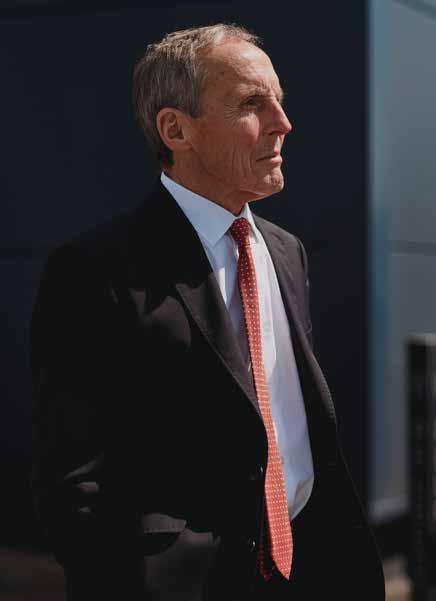
For over 50 years, Simon Bailes has been at the forefront of the North East motor industry. From pioneering electric vehicle adoption to championing community causes, his business journey is a masterclass in innovation, impact and staying ahead of the curve.
Simon Bailes is an entrepreneur of 50 years standing. Originally from Teesside, he established his own car dealership in the 1970s and which has grown to become been a leading name in the North East motor sector. An industry leader and a pioneer, he currently serves as the vice-chair of the European Peugeot Dealers Association, ensuring the UK’s voice is heard in the decision making by the global parent company, Stellantis. Simon Bailes Peugeot has long
recognised the transformative potential of electric vehicles. Its foresight in the EV sector has been instrumental in addressing concerns such as public charging infrastructure and battery longevity, positioning the company as a trusted advisor in the transition to electric mobility and making it the go-to for businesses looking to take advantage of financial benefits whilst decarbonising their fleet.
The company's proactive involvement
in the SwitchEV research project, conducted by Newcastle University between 2010 and 2014, provided invaluable insights into the practicalities of EVs for commercial use. By supplying 22 electric vehicles to local organisations including Northumberland Police, the Forestry Commission, and Virgin Money, Simon Bailes Peugeot helped gather critical data on journey planning and battery efficiency. This project underscored the dealership's dedication to advancing EV technology and educating the public on its benefits, as well as giving Simon Bailes Peugeot unrivalled insights into the application of EVs.
Over the years, Simon Bailes Peugeot expanded its operations to become the UK’s leading retailer of Peugeot commercial vehicles, adding dealerships in Guisborough and Stockton, alongside its first dealership in Northallerton. Peugeot's current electric and hybrid fleet showcases the brand's commitment to sustainable mobility and innovation. The lineup includes fully electric models like the e-208 supermini and the e-2008 SUV. Peugeot's plug-in hybrid range features the 3008
C-SUV, the 508 sedan, and the 508 SW, all available in Hybrid and Hybrid4 versions.
These models combine a 1.6-litre PureTech petrol engine with an electric motor, offering both frontwheel and all-wheel drive options, and allowing businesses to go further and get more done. Additionally, Peugeot offers fully electric versions of its commercial vehicles, including the e-Partner, e-Expert, and e-Boxer vans, catering to a wide range of business needs.
Beyond supporting local business, Simon Bailes Peugeot is known for its charitable endeavours. The company's long-standing sponsorship for young sports people chasing their dreams, local charities, educational projects, and even Northallerton Male Voice Choir, have made it a pillar of the North East community.
Simon Bailes Peugeot's unwavering commitment to innovation, excellence in commercial sales, and community involvement has made the business a beacon of success in the region’s motor industry.
Simon’s story proves that entrepreneurs who start up in the North East can grow in terms of sales, profits and influence.
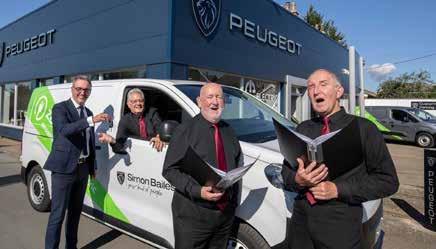
Sheldon Cockburn, Head of Operations, with members of Northallerton
Voice Choir, after Simon Bailes Peugeot provided the choir a van to help transport musical equipment and mobile staging.

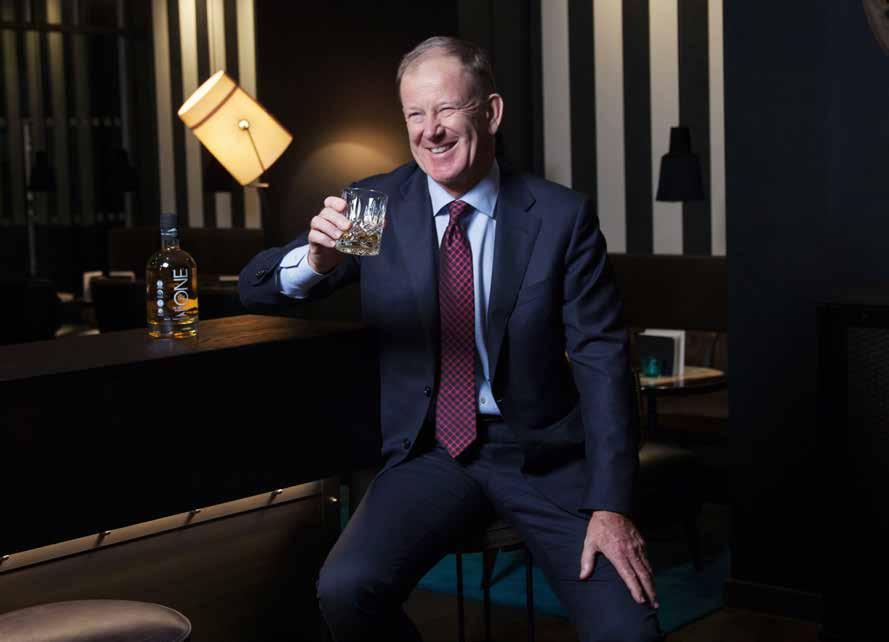
Introducing one thing I’ve learnt – a dynamic new feature where our ambassadors and honorary members reveal the one game-changing lesson they've learnt on their entrepreneurial journey. Providing a source of inspiration for anyone pursuing a similar path, our guest editors will share some of the critical business challenges they’ve faced – and how they overcame them.
In our inaugural edition, visionary entrepreneur Nigel Mills CBE – founder of Mills Group and The Lakes Distillery, former Chair of the Entrepreneurs’ Forum, and one of the ‘Maserati 100’ entrepreneurs for 2016 – reveals how separating leadership and management is key to building a resilient business.
Images: Christopher Owens and NET
Over my nearly 40-year career, I’ve had the privilege of creating and leading two significant businesses, both of which were successfully sold.
Mills Group grew from 11 newsagents in 1986 to a national chain of 85 convenience stores, generating £170 million in annual sales with 2,000 employees before being sold to Tesco in 2011.
The second, The Lakes Distillery, was founded in 2011 and sold to Nyetimber Sparkling Wines in June 2024.
Both ventures spanned more than a decade, encountering numerous internal and external challenges that tested their viability.
The one thing that was difficult to plan for was the ever-changing needs of the business landscape. Change comes from all directions, whether it’s UK legislation, economic fluctuations, devastating floods and climate change, Brexit, wars or even a global pandemic.
Back in 1986 when I established Mills
By separating the role of CEO/ Founder (who focuses on strategy, vision and external challenges) from that of a COO/MD (who ensures smooth day-to-day operations) a business is far better equipped to scale and withstand uncertainty.
Group, I focused primarily on the internal business changes and (rightly or wrongly) assumed that the external changes would be predictable or negligible. I was naïve at the best of times.
In April 1994, the government changed the way that newspapers and magazines were distributed in the UK, ending the exclusivity newsagents had enjoyed for nearly a century. Then, that August, the government introduced the Sunday Trading Laws allowing all retailers to open on Sundays, albeit for a limited amount of time, eroding our very profitable weekend sales. Our business model was primarily based on these two exclusive rights and their removal wiped 40% off our core turnover and the bulk of our profits. Salvation came in the form of new legislation: the launch of the National Lottery in November 1994. Securing lottery terminals in all our stores brought in a vital 5% commission on sales and boosted footfall, allowing us to retain our customer base and restore profitability. Without this, 1994 could have been the end of our business.
In 2011, the Lakes Distillery was built in anticipation of a change to the Global Whisky Industry, a similar change to the one I had witnessed in the wine industry, with New World wine challenging the Old World wine status quo. The distillery commenced distilling an English whisky spirit in December 2014.
To help us deliver on our vision, we appointed a Whisky Maker in 2017 who honed his craft at Macallan, pioneering innovative cask preparation techniques that enhanced the depth and complexity of our whisky. We looked at not only what whisky is but what it can become.
To exploit these innovative
techniques, we needed additional funding of £15m which we decided to raise via an IPO on the London based AIM market. After nine months of preparation, and pitching to over 60 fund managers, we secured the necessary commitments just days before our closing date.
Then, disaster struck. In the following days, the stock market dipped and Patisserie Valerie (a publicly trading company) revealed a major fraud, forcing it to scramble for emergency funding. Some of our potential investors redirected their capital, leaving us with only half of the required funds when we closed the raise. We had no choice but to withdraw from the IPO. This left us with no money and half a million in debt!
With a lot of hard work and the never-ending support of existing and new shareholders we secured funding off-market and delivered on the investment programme needed to develop our innovative sherry-led whisky, survive the pandemic and win the coveted World’s Best Single Malt Whisky Award in March 2022. The rest is history.
These unpredictable events reinforced a critical truth: while external factors can threaten a business’s survival, the real challenge lies in how leadership responds. I realised that no matter how strong our strategy or culture, navigating these crises required both a clear vision and the operational ability to adapt quickly.
This is where the distinction between leadership and management becomes essential. By separating the role of CEO/ Founder (who focuses on strategy, vision and external challenges) from that of a COO/MD (who ensures smooth day-to-day operations) a business is far better equipped to
scale and withstand uncertainty. With this division in place, plus an aligned board of directors, a business is more likely to thrive and scale efficiently. Had I better understood this distinction earlier, we may have reached even greater levels of success.
I once read: “It is the easiest thing in the world to start a business and the hardest thing in the world to hang onto it” and my experience gives testimony to this phrase. No matter how good the culture and
business strategy, there is only one person that has the responsibility to deliver business success for all the stakeholders in the business: the CEO / Founder.
For those interested in exploring these concepts further, I recommend two books: What You Do Is Who You Are by Ben Horowitz, which delves into business culture, and 7 Powers: The Foundations of Business Strategy by Hamilton Helmer, which provides invaluable insights into strategic decision-making.
Want the opportunity to connect with like-minded individuals who understand the highs and lows of entrepreneurship?
Head to our website to find out how you can become a member or scan the QR code to explore the different options available. Membership starts from as little as £52 + VAT per month.
A series of practical workshops throughout the year to accelerate your business growth - designed for leaders who want results.
Upcoming workshops:

17th June – Leadership strategies for success 16th September – Boosting growth & profits 16th December – High-performing cultures
Location: Fernwood House, Jesmond
Cost: £75+VAT per month for annual membership (£225+VAT per session).
Expert insights & best practices
Strategy, confidence & accountability
Peer collaboration & real-life case studies Monthly check-ins to keep you on track
To book your spot, scan the QR code or email dadamson@robson-laidler.co.uk


Supporting entrepreneurship
Tell us about yourself?
Where to start? I have a four-year-old and five-year-old to keep me on my toes. I love food – both eating and cooking – and wish I played more sports than I do. But if you really want to know me, you should know that I have a real dislike of soup and penguins. Not as a combination, I should probably add! And I don’t drink hot drinks, so I find coffee shops quite intimidating. I grew up in Northumberland and was fortunate enough to spend some of my teenage years living in Cape Town as my dad’s job with Newcastle Breweries took us out there. Although I’ll forever love South Africa, for me, the North East is truly home. For nearly 15 years, I've had the privilege of working at RBC Brewin Dolphin in Newcastle, where I provide financial support and investment management services to our clients, with a particular emphasis on business owners and
entrepreneurs. We’ve been operating from the heart of the city for over 120 years, and I'm proud to contribute to this long-standing tradition. While I've never turned my hand to entrepreneurship, I did dabble with business ideas during my school and university days. Who knows, maybe one day I'll get that spark and take the plunge – but for now, I'm happy supporting business owners on their growth journey in my role as a Director of Wealth Management.
Tell us a bit about RBC Brewin Dolphin in Newcastle?
We’ve been providing financial support to people in Newcastle since 1903 and now employ 350 people in our city centre office. The world of financial advice and investment management, what we call wealth management, is shifting quickly. Regulation, laws, and consolidation in the sector mean there’s probably never been
a period of so much change. One of the things that gives me, and our clients, comfort is the scale of our organisation in the North East. We can surf the wave of change far more easily than some other firms.
You’ve supported the Forum for a long time, why do you keep doing it?
I was born and raised in the North East and like so many of us who choose to live here, I’m deeply passionate about the region. To see it thrive, I think the spark of change and growth needs to come from business owners. We want to see more businesses succeed, and more small and medium-sized businesses become larger and more successful.
That can only be good for the region but also the UK economy. If our support of the Forum and its members can help make this happen faster, then we’ll keep providing all the support we can.
What do you enjoy most about working with Entrepreneurs and Business Owners?
I love learning about so many different businesses from so many different sectors. Each person that founded and runs those businesses has their unique way of achieving success, which I find fascinating. The passion is contagious, and I take so much of that into my own work.

Unbelievably easy. Incredibly powerful.
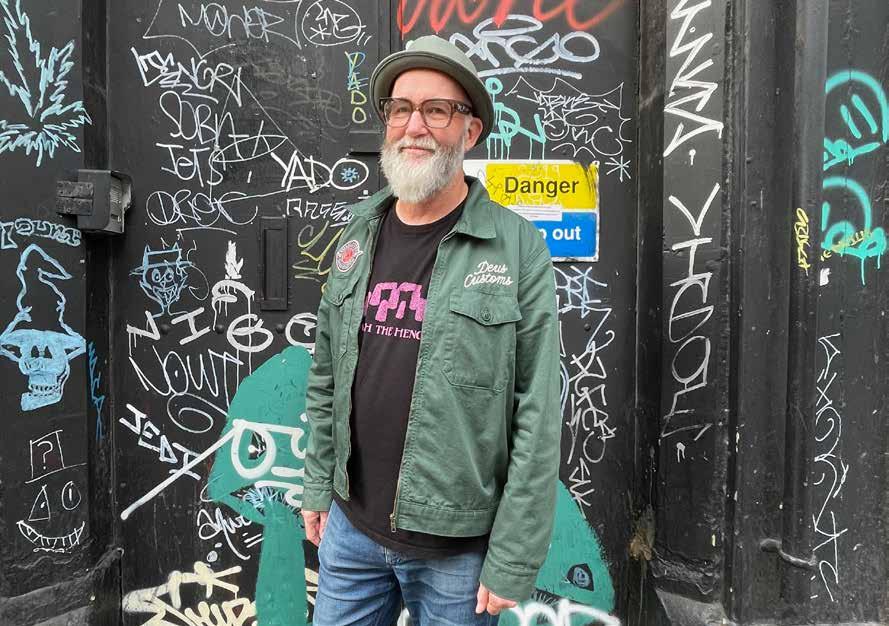
Forum checks in with serial entrepreneur and Forum Board member, Mike O'Brien, on life after Opencast - from launching a London record store to reopening one of Newcastle’s legendary music venues…
Mike O’Brien has never been one to sit still. After stepping away from Opencast, the tech consultancy he founded, most would have expected him to slow down. But, as he puts it, ‘retirement’ isn’t a word in his vocabulary. Instead, he’s dived headfirst into the world of musicopening a record store in London, spending time as a tour driver for punk poet John Cooper Clarke, and most recently, reviving one of Newcastle’s most beloved music venues.
“I think I’d turn to dust if I stopped doing things,” he says, laughing. “People ask if I’ve retired, and I tell them no - I’ve just taken
on a few new projects.”
Mike’s love of music started early.
“I’ve always loved music. It’s been a constant in my life since I was a kid growing up in Whitley Bay,” he says.
“I grew up in a house where the radio was always on - and lots of school friends had older siblings with great record collections that I’d tape bits from. But it was one gig that really changed everything. The Ramones at City Hall in Newcastle - my first live show. That was it. It blew my mind.
We were just these scrawny teenagers surrounded by huge blokes in leather jackets, and it was loud, raw and exciting. I was hooked.”
If launching a tech consultancy was a
strategic career move, getting into the music business has been more a series of happy accidents. His passion for music followed him through life but it wasn’t until a chance meeting, at a networking event, that it became more than just a hobby.
“I was at one of those corporate dinners, feeling a bit bored, and ended up chatting with this guy, Tim Harper. Within minutes, we were talking about music, skateboarding, photography - all the good stuff,” Mike recalls. “The next day, I randomly bumped into him in a pub in Newcastle on the way to a music show. We kept in touch, and any time I was in London for work, we’d go to a gig together.”
Years later, a message popped up in ‘Tim’s Confusing Gig Group’, the dedicated music and gigs WhatsApp group that both Tim, Mike and eight of their friends are part of: “Anyone fancy buying a record store?”.
“There was no hesitation,” he admits "It was a well-known secondhand record shop in Camberwell, but when
we looked into it, we quickly realised it wasn’t really for sale - at least not in the way we expected. The owner wasn’t selling his stock or PA system, just the lease and the name. We didn’t want to take on someone else’s name; we wanted to build our own identity.
“Tim and a couple of the other guys in London rounded up friends to help with the fit-out. Suddenly, we were figuring out things like ‘What kind of cabinets do you need to stack records?’, ‘How do we lay them out?’, ‘Oh, we need a till!’ It all spiralled at 100 miles per hour.
“The London team runs the day-today, but we all get the joy of being involved. Friends drop by to buy vinyl, we host live music, and it’s become an amazing part of the local community. It’s a real joy to own a record shop - it’s such hard work for the London crew, but a great business challenge in 2025.
“We’ve also have a café a couple of doors down, Henge, and a record label attached to it too, which is really exciting - especially when the name

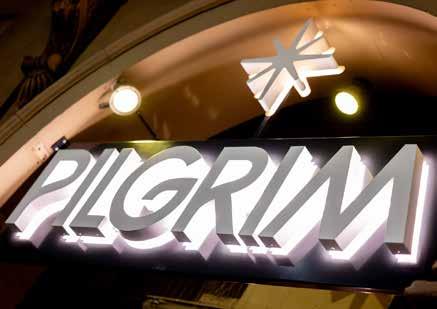
gets read out on the radio by Iggy Pop. It’s all grown so organically, but that’s what makes it fun for all involved."
Before they knew it, ‘Dash the Henge’ was born and that ‘spur of the moment’ decision has since turned into something much bigger, even catching the attention of Netflix. “Tim got an email from Netflix and thought it was a scam,” he laughs. “They were scouting locations for Lena Dunham’s latest series, Too Much, but we didn’t take it too seriously at first. Turns out, Lena’s boyfriend had been to the shop and loved it. Next thing we know, they’re shutting down three streets for filming.”
Mike’s latest venture, PILGRIM, was another unexpected turn. "It was one of those funny, serendipitous things.
I was sitting at a table with Lisa Eaton at the Entrepreneurs’ Forum annual awards, and we got talking about business,” Mike recalls. “Not long after, we grabbed a coffee, and she told me about her business, Fabric.
I thought it sounded really interesting, so I agreed to invest. Around the same time, she was looking for a CTO. I wasn’t the right fit, but I thought my friend Paul Dyson would be perfect - though it turned out he had already invested!
“Long story short, during investor meetings, we kept hearing about this
I think I’d turn to dust if I stopped doing things. People ask if I’ve retired, and I tell them no - I’ve just taken on a few new projects.
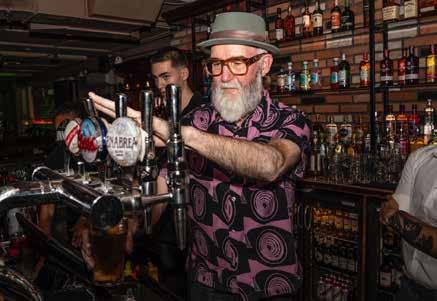

Michael Lavery - big in marketing and education, and everyone had great things to say about him. When we finally met, I had to dash off, but Paul stuck around chatting and later texted me: ‘Hoochie Coochie in Newcastle is for sale, Michael just mentioned it.’ Paul and I had always talked about doing something in music, but in that vague, ‘one day’ kind of way. Suddenly, here was an actual opportunity.”
“We’d never actually been there, which is hilarious in hindsight,” Mike admits. “But we knew it had a great reputation. So we went to a gig there - my son’s friend was playing, funnily enough - and we just loved the atmosphere. Paul messaged me afterwards: ‘What do you reckon?’ I said, ‘Hell yeah.’”
Convincing the venue’s owner and landlord wasn’t easy. “The owner had turned down a lot of offers because he wanted the right people to take it on,” Mike explains. “So the three of us put together a solid business plan, showed that we were serious about live music, and I roped in a mate from
my days working in New York who works in hospitality to help with the pitch. It all just clicked.”
“We just called it ‘Project PILGRIM’ at first, because it was on Pilgrim Street,” Mike explains. “But the more we thought about it, the more we loved it. Music is a pilgrimage, isn’t it?
People travel for gigs, for festivals, for that one special live performance. It just fits.”
“We pulled off the rebrand in just two weeks with a real startup mentality. Many friends helped to design and paint the interior, create cocktails, find new chandeliers, decorate the loos!! Two hours before opening we were brushing plaster dust and paint out of the new carpet and wondering why the lights weren’t working. We definitely didn’t expect the turnout we got for a 250-capacity venue on opening night. There was a queue down the street in January, which felt pretty special,” he says.
“PILGRIM is all about live musicthat’s why we got involved in the first place. The venue had been through a lot, especially over lockdown, so it
needed a fresh start. Michael used his contacts to bring in great acts, but we also have to rebuild the audience. We’re experimenting as we go, figuring out what works and what doesn’t. We just want to put on really great, interesting music,” he explains. The best part? Mike never plans these things, he simply has a knack for turning passion projects into thriving businesses. Whether it’s investing in a documentary about reggae legends, The Cimarons, or spending a summer driving punk poet John Cooper Clarke around on tour, his post-Opencast life has been anything but quiet.
“John Cooper Clarke was an absolute dream to be around,” Mike says. “A friend of mine was working with his tour manager, and they needed someone to drive him around for some UK shows. I thought, why not? Every morning, he’d pull the newspaper from his pocket and reference something he’d just read that day, and then later that night, you’d see him on stage weaving it into his performance like it had been in his set for years. He was just brilliant, and he gave everyone his time. My friends kept saying, ‘The stories you must have heard!’ and honestly, they weren’t wrong.”
If that wasn’t enough proof that music is stitched into the fabric of Mike’s life, there’s also the night he left the Entrepreneurs’ Forum Awards Dinner to take his daughter to see Arctic Monkeys.
“I’d been nominated for their Emerging Talent award and I should have been celebrating, but Elizabeth had been desperate to go to the Arctic Monkeys gig that night. Tickets had sold out in minutes, and prices on resale sites were ridiculous. Then, out of the blue, a mate of mine, who
knows the band, texted Alex Turner and got us on the guest list.”
He laughs, recalling the mad dash across town. “She had a fashion show at school that evening, so I’m there in a dinner jacket, watching this show, checking my phone, thinking, ‘If we don’t leave soon, we’re going to miss this.’ Finally, she runs out, we throw on our leather jackets, and we’re straight to the arena. She couldn’t believe it - seeing all these people queuing outside while we just walked right in. Her first gig, and it was Arctic Monkeys. Not bad, right?”
This is just one of Mike’s many brushes with rock royalty. There was also the time, in the late 2000s, when he spent three hours drinking with a group of “Scottish guys” in the legendary Bowery Lobby bar, New York.
Mike recalls, “We spent hours chatting about our mutual love of Scottish bands before one of them mentioned they were also all in a band - Biffy Clyro”. At the time, the Scottish three piece were in New York recording their 2009 album Only Revolutions at the world famous Electric Lady Recording Studio - the lead single of which was covered by X Factor winner Matt McArdle in 2010 and made Christmas number one that year. For Mike, these interactions and experiences aren’t just great stories - they’re part of the reason he keeps chasing new projects.
“I don’t really see it as work,” he says. “It’s just what I do. And if you get to meet new best friends and your heroes along the way? Even better.”
From software development to record stores, live venues, and even film production, his career has been anything but predictable. And as for what’s next? He grins. “No idea. But I’m sure something will come up.”
Earlier this year Mike joined Yvonne Bell at Radio Tyneside to take part in their ‘Tracks of My Time’ feature. During their time on air, Mike detailed the eight songs that have shaped his life so far.
1. Rockaway Beach, The Ramones
2. (White Man) In Hammersmith Palais, The Clash
3. Another Girl, Another Planet, The Only Ones
4. To Have And To Have Not, Billy Bragg
5. Where Is My Mind, The Pixies
6. Fools Gold, The Stone Roses
7. Sure Shot, Beastie Boys
8. Jesse Malin, Shining Down
Listen to Mike's episode here:
From motivational and entertaining reads, tv shows and podcasts, forum picks out a selection of inspiring media...
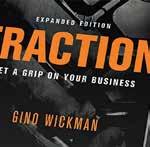
Traction: Get a Grip on Your Business by Gino Wickman
Gino Wickman’s passion is helping people get what they want from their businesses. To allow him to do just that, Wickman created the Entrepreneurial Operating System (EOS)®, a holistic system that, when implemented, helps leaders run better businesses, achieve a healthier work-life balance and gain more ‘Traction’. In this book, you'll learn the secrets to strengthening the six key components of your business, simple yet powerful ways to run your company that give you and your leadership team more focus, more growth and more enjoyment.

Shrinking (Apple TV)
Now in its second season, Shrinking is a critically acclaimed American comedy drama from the team behind multi Emmy Award winning series ‘Ted Lasso’. The show follows grieving therapist Jimmy Laird, played by Jason Segel, as he struggles to deal with the sudden death of his wife. Breaching ethical barriers he decides to try a new approach: unfiltered, brutal honesty. Telling his patients what he really thinks, resulting in massive tumultuous changes to people’s lives … including his own. With a stellar cast that includes Hollywood cinematic icon Harrison Ford, the series uses dark humour to explore themes of loss, depression and vulnerability.

No Such Thing as a Fish
No Such Thing as a Fish is an awardwinning weekly podcast in which ‘QI Elves’ Dan Schreiber, James Harkin, Anna Ptaszynski and Andrew Hunter Murray share the most bizarre, extraordinary and hilarious facts they’ve discovered over the last seven days. This cultural phenomenon has released 500+ episodes with over 500 million listens, becoming one of Spotify's top podcasts of the last decade. Guest hosts have included comedian Tim Minchin, Slipknot frontman Corey Taylor and astronaut Major Tim Peake.
Maven is one of the UK’s most active private equity investors and has a track record of identifying and supporting high growth businesses. In the North East, Maven manages three regional funds and also invests on behalf of the Maven Venture Capital Trusts. Here, Maven showcases three of their latest collaborations with great North East entrepreneurs

The job of a Venture Capitalist is to seek out ambitious entrepreneurs and help them realise their goals. Done correctly this will deliver substantial returns for our investors and generate material wealth for founders and management teams.
The opportunity to work with the Forum provides us with an excellent opportunity to meet with entrepreneurs and potentially work together.
Over the last few months we’ve completed exciting deals with some great North East entrepreneurs:
Fintech software
The North East has one of the fastest growing technology hubs in the UK with notable success and expertise in FinTech.
We recently backed Kani Payments with a multi-million pound Series A investment to further develop its software and to grow sales in the UK and US markets.
Kani is led by CEO Aaron Holmes and is a specialist in automated payment reconciliation. The platform is already highly developed and has reconciled over €24billion in processed payments across 5 continents. Increasing regulations, complexity of transactions and the ongoing growth in digital banking and financial solutions are all driving substantial growth for the Newcastle based company.
Challenger food brand
Tiba Tempeh is a fast growing challenger food brand. The business
was founded by Alexandra and Ross Longton, with a mission to create a healthier world by inspiring people to eat more naturally healthy and sustainable plant based foods. Tiba has a growing range of natural high protein, tempeh derived products with listings in Sainsbury’s, Waitrose, Morrisons, Ocado, Aldi, Carrefour and Leclerc.
The investment has got off to a
fantastic start with Tiba Tempeh being recently recognised by Nielsen as the fastest growing brand in the UK chilled meat-free category, growing 736% year on year.
In October, we invested £3.5million into solar energy specialist Power Roll as part of our wider strategy to support the transition to Net Zero through direct investment into innovative companies in the renewables sector.
The Durham based business is led by CEO Neil Spann, and has developed a unique, flexible, lightweight solar film capable of producing ultra-lowcost green electricity that is up to ten times cheaper to make than existing flexible solar photovoltaic technologies.
The new funding will allow Power Roll to accelerate the development of its pilot plant, enabling small scale manufacture of its solar products.
Locally, Maven manages the Finance Durham Fund, Northern Powerhouse Investment Fund II Equity fund, and North East Development Capital Fund. We also invest on behalf of the Maven Venture Capital Trusts and Maven’s Private Equity funds.
We provide funding from £100,000 to £10million to early stage and established businesses and offer both growth capital and funding for MBOs and M&A.
To find out more about our funding options and how Maven can help you grow your business, please email Michael Vassallo at
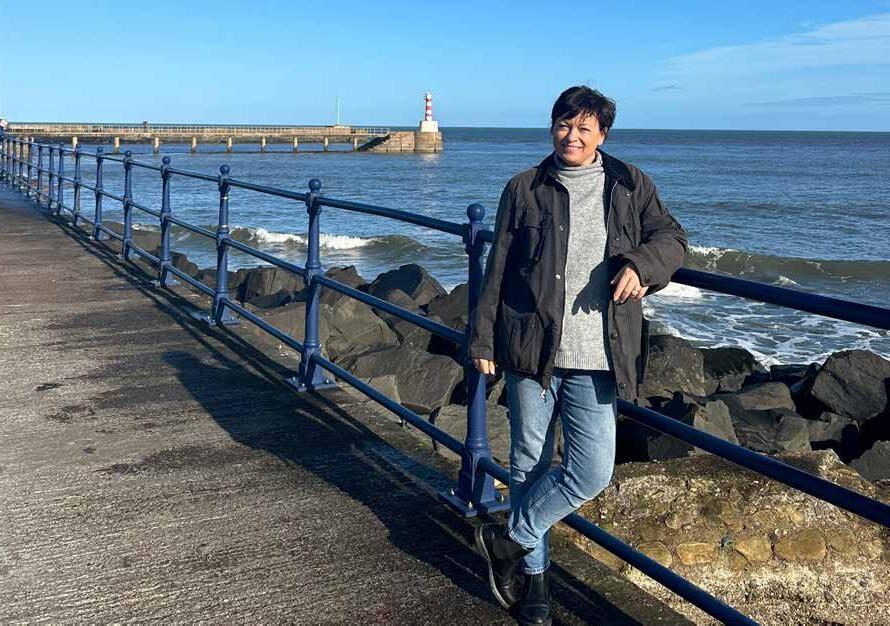
How well do you know your fellow members? In our brand-new feature, we shine a light on some of the Forum’s longest standing members, exploring their business journey, their connection to the North East and what makes it such a special place to live, work and grow a successful business. Kicking off the series is Kari Owers, founder of Newcastle-based O.agency, Entrepreneurs’ Forum board member and winner of our 2024 ‛Impact’ Award.
O.agency is known for their work with high-profile, global brands such as Dr Martens, Flymo and Fentimans. Can you tell us what the business does?
We might be known for those big national brand campaigns but we actually work with a wide range of businesses — from fast-growth tech companies and property developers to local infrastructure organisations like NE1 and Port of Tyne.
We’re a strategy and creative comms agency, so we help companies define who they are and then we go big on the ideas to make them famous. How we get the message out depends on who we want to reach, but it can be anything from launching a profileraising media campaign to organising an experiential event, creating a social media advertising campaign, working with influencers or filming a brand video.
What are the best and worst parts of your job?
The best part is sitting in boardrooms with decision-makers, shaping a
company’s reputation and contributing to its growth and success. I always tell my team that’s a real privilege.
The worst is when brand comms doesn’t have a seat at the table — its impact is, at best, underestimated and, at worst, cut from the budget. Reputation and awareness are two of the most important drivers of success — it’s vital to stand out in today’s competitive, multichannel world.
What do you consider to be your greatest achievement?
My two kids — well, they’re adults now. They were very small when I started the agency and have seen the ups and downs of running a business — from the late nights and stressful days to the glamorous bits, like VIP invites to client events.
Winning the inaugural Impact Award at the Forum’s Entrepreneurial Awards last year was a big moment. I’ve given a lot of opportunities and time to young people over the last 20 years in business because I believe





We chat with WowzaBox founders Joshy Jin and Georgina Li about turning a passion for Chinese cuisine into a thriving business - one meal kit at a time...
When Joshy Jin arrived in Newcastle as a student, he found himself frequently dining out in Chinatown, searching for the authentic flavours of home. But something was missing. “I noticed a gap in the market for good-quality Chinese food. It was either Westernised or just not as fresh and authentic as I knew it could be,” Joshy explains. “That’s when I realised there was an opportunity. Chinese food was everywhere, but there wasn’t anything that truly represented the real deal.”
Determined to change that, Joshy travelled back to China to immerse
himself in the art of traditional Chinese cooking. He trained under expert chefs, mastering techniques and learning the deep-rooted cultural significance behind each dish. With this new-found knowledge, he returned to Newcastle with a clear goal: to bring authentic Chinese flavours to the UK in a way that was both accessible and high-quality. Upon his return, he opened his own restaurant with longtime friend Georgina Li, which quickly became a success. The kitchen, however, presented a challenge. “Chinese food is complicated to cook. The
techniques are intricate, and sourcing the right ingredients can be tough. We struggled to train chefs because the skills needed were so different,” he explains. “So we streamlined the process by assigning chefs to specific parts of the cooking process, which made things much more efficient. That’s when we started thinkingcould we scale this up?”
This was a conversation he frequently had with Georgina, who shared his passion for authentic Chinese cuisine. Their friendship, built over years of shared meals and discussions about food, naturally
evolved into a business partnership. “Georgina and I had always bonded over food. She had a background in business, and I had the culinary expertise - it was the perfect match,” Joshy says. “When we started talking about meal kits, it all just clicked.”
The answer came in the form of WowzaBox, the meal kit service they co-founded. “Restaurants are a huge investment, and they’re difficult to scale. But meal kits? That was a way we could bring authentic Chinese food to as many people as possible,”
Joshy says.
“Joshy and I have complementary skills, so we naturally divided our roles based on our strengths. Joshy, as a professional chef, focuses on product development, recipe creation, and production quality. He also leads the team with strong management skills. I focus more on data analysis, visual presentation, marketing, brand strategy, and customer experience. That said, as a small founding team, there’s always some crossover, and we often step into each other’s roles as needed,” explains Georgina.
WowzaBox launched in 2022 and quickly became a success delivering
over 150,000 meals in its first year and generating a turnover of more than £675,000. “During COVID-19, people became more familiar with the concept of food arriving at their doorstep, so we knew the timing was right,” says Joshy.
In an industry dominated by big names like HelloFresh, WowzaBox knew it had to stand out. “What sets us apart? You don’t even need to touch a knife,” Joshy says with pride. “We’ve done all the chopping, seasoning, and hard work for you. You can have a proper Chinese meal ready in under 10 minutes. That’s the game-changer.”
Beyond convenience, the focus is on authenticity. “Most Chinese meal kits don’t really deliver on taste. We do. We’re not just offering something ’inspired by’ Chinese food; we’re giving you the real thing,” he adds.
“Our core difference lies in our USP - authenticity, freshness, and convenience. We want our customers to be able to prepare restaurantquality Chinese meals at home in a short amount of time. As a start-up with limited resources, staying truly authentic while balancing production and marketing has been a challenge. It’s not always easy to stick to authentic flavours in a local market, especially when ensuring consistency between product and messaging. But we’ve remained committed, and we’re proud that WowzaBox has successfully maintained this balance,” explains Georgina.
Transitioning from running a restaurant to operating an online retail business wasn’t without hurdles.
“It’s a completely different mindset,” Joshy admits. “We made a lot of mistakes in the beginning, particularly on the marketing side. But we learned quickly.”
Scaling up was another challenge.
“As we grew, we had to hire more people and make our processes more efficient. Despite our success, we’re still a small business, and every decision has to be calculated,” he says. “Food businesses operate on small margins, and every cost increase - whether it’s ingredients, packaging, or logistics - hits us hard.”
One of the biggest challenges?
Balancing sustainability with cost.
“Sustainability is important - we all live on this planet, after all. But the food industry has some harsh realities. People love to hear companies say they’re sustainable

We’re not just building a meal kit business, we’re redefining how people experience Chinese food.
but it’s not as straightforward as switching to eco-friendly packaging and calling it a day,” Joshy explains.
“But it’s an important factor to us so we do what we can. 95% of our packaging is recyclable. We use recyclable plastic film even though it’s more expensive and tough on our machines.”
“We’ve faced the same challenges as other meal kit brands - like balancing costs and maintaining product quality.
But we’ve chosen not to take shortcuts by increasing prices or reducing quality. We’re willing to sacrifice short-term profits to build customer trust. Sometimes, taking the longer route and focusing on word-of-mouth turns out to be more efficient in the long run,” says Georgina.
WowzaBox also sources ingredients responsibly, but Joshy is upfront about the difficulties. “We prioritise British and local suppliers where possible. We work with suppliers like JR Holland and Dungait Farms for British-grown produce, and our seafood is sustainably sourced from places like Phil Plaice and Taylor
Seafood. But the reality is, some ingredients just aren’t available locally. Sustainability is about making practical, meaningful choices - not just ticking a box.”
WowzaBox isn’t stopping anytime soon. “We’re growing fast. We’re hiring more people, expanding our production, and planning to move into a bigger premises soon,” Joshy says.
As for their proudest moment so far?
“Developing our product. People assumed Chinese food was too complex for meal kits, but we cracked the code. We’ve created a system that delivers real, restaurant-quality meals straight to people’s kitchens. That’s something we’re really proud of,” explains Joshy.
“For me, the most rewarding moments come from customer feedback. I remember one customer who wrote to thank us - he had been living in a remote area and hadn’t tasted authentic food from his hometown in over ten years. He was
truly moved. Another customer, a British man who had lived in China for years, told us how our meal kits helped him relive familiar flavours and share those memories with his family. We also hear from healthconscious customers who say they finally feel confident they’ve found Chinese food that’s clean, healthy, and delicious,” adds Georgina. For aspiring food entrepreneurs, Joshy has some straightforward advice: “Think long and hard before jumping in. The food industry is tough. If you just want a small family business, go for it. But if you want to build a food brand? Be prepared for a long, difficult road. Make sure your product is actually good, because marketing alone won’t save you. Customers will only come back if the food is worth it.”
Every day brings new challenges, but that’s part of the excitement,” Joshy says. “We’re not just building a meal kit business, we’re redefining how people experience Chinese food. It’s an extremely popular cuisine in the UK, but there’s no go-to brand for it yet. We want WowzaBox to be that brand - the name people think of when they want real, high-quality Chinese food at home. This is just the beginning.”’
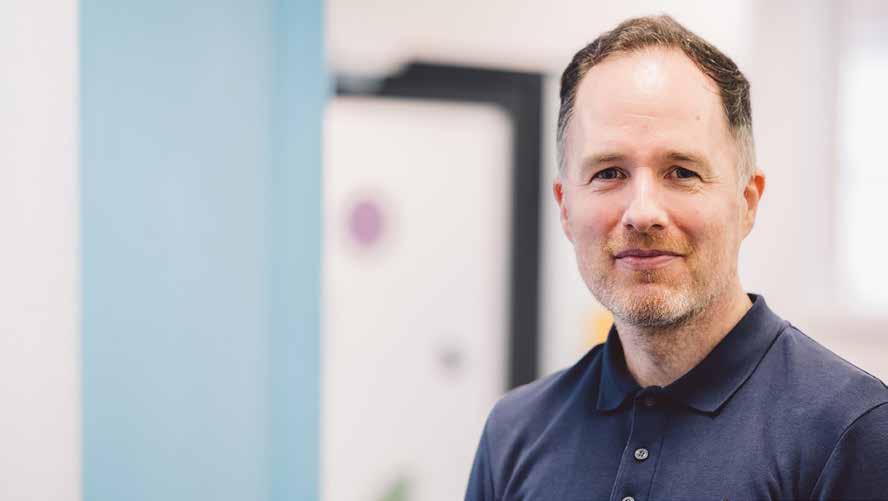
With the 2025
tax
year now well underway, award-winning accountancy firm Blu Sky shares its plans to further strengthen its tax team and evolve services to better support growing businesses across the region.
The firm also plans to welcome additional team members by the end of quarter four as part of its continued investment in specialist expertise.
This development forms part of Blu Sky’s wider commitment to delivering proactive, practical advice that helps clients plan with confidence. With tax legislation becoming more complex and HMRC scrutiny on the rise, businesses are increasingly looking for clarity, forward planning and peace of mind. To meet that demand, Blu Sky recently welcomed three new faces to its growing tax team.
Adrian O’Connell joined as Head of Tax towards the end of 2024, whilst Henry Cotson moved into a full-time Tax Accountant role after successfully completing work experience with the firm. Most recently, Ben Murphy
has joined as Tax Manager, bringing additional experience and capacity to support the firm’s growing client base.
“Tax isn’t just about compliance anymore,” says Adrian. “It’s about helping businesses understand where they are, where they want to go, and how smart tax planning can support that journey. At Blu Sky, the emphasis is on being approachable, forward-thinking and genuinely useful. That’s what attracted me to the team.”
Adrian brings significant experience from both accountancy practice and in-house roles. Known for his personable approach, he is already helping shape Blu Sky’s tax services with a focus on accessibility, innovation and insight.
At the same time, Henry’s journey
from work experience to full-time Tax Accountant reflects Blu Sky’s commitment to nurturing talent and creating long-term career opportunities.
“I’ve been supported every step of the way,” Henry explains. “It’s been a fantastic experience, and now I’m excited to be working directly with clients and helping them make sense of what can often feel like a minefield.”
The expanded tax function is already developing new tools and services designed to remove friction, reduce risk and add real value.
Whether supporting R&D claims, guiding clients through structural decisions, or building tailored tax strategies, the team is focused on making tax feel less daunting and more empowering.
“We know that for many SMEs, tax can feel like a headache,” says Blu Sky Co-founder and CEO Jon Dudgeon. “Our goal is to change that.
By investing in our people and services, we’re helping business owners not only stay compliant but make smarter decisions that benefit their bottom line.”
As a B Corp-certified business with a strong client base across the North East and beyond, Blu Sky continues to champion businesses with purpose and ambition. Blu Sky’s clients span the tech, digital and professional services sectors and many are scaling rapidly, meaning they require timely, reliable guidance.
This phase of growth for the tax team is not just about expanding headcount. It’s about raising the bar and evolving the way tax advice is delivered, ensuring it is strategic, human and tailored to the real-world challenges faced by today’s entrepreneurs.
Blu Sky’s message is simple. The right tax advice should not just tick a box. It should give businesses the tools to grow, adapt and succeed.


In this exclusive interview Forum member, Dr Olusola Idowu, the trailblazing scientist and entrepreneur behind Hexis Lab, and finalist in our 2024 ‘One to Watch’ award category, reveals how he's revolutionising skin and haircare with groundbreaking innovations from Newcastle’s biotech frontier.
Dr Sola decided he wanted to pursue his own ideas. “I founded Hexis Lab in 2013 as I wanted to have a go at developing my own ideas. And what I noticed is that there are a lot of gaps in terms of opportunities that are on the market. AI then, before it became something famous, was something we had already been using for the last 20 years. So I thought we’re going to move that into beauty and personal care because that is where I saw the biggest gap, the biggest opportunity. The world essentially needs reformulation. We need to develop better products for different skin types, sustainable products and clean products.”
Hexis Lab is a biotech discovery company that uses an AI platform to develop sustainable and effective cosmetic, personal care and pharmaceutical products. The goal? To move away from traditional trial-and-error methods and create scientifically validated products without the need for animal testing.
“In the beginning, they didn’t understand AI, they didn’t understand big data, they didn’t understand what could be done. Even now people are still only scratching the surface and trying to understand what AI is capable of,” he explains.
Artificial intelligence (AI) is transforming industries across the board, and the beauty sector is no exception. By blending cutting-edge AI with natural ingredients, Dr Olusola Idowu, or Dr Sola as he prefers to be called, is proving that science-driven beauty is the future - creating products that are as effective as they are sustainable.
Born in Lagos, Nigeria, Dr Sola’s journey has taken him across the world, but it was Newcastle that became home. “I did my first degree in Nigeria and my boss at the time had the most phenomenal Geordie accent,” he laughs. “I grew up being aware of Newcastle United Football Club but that was my first proper introduction to Newcastle. Later, when I saw a PhD opportunity there, I knew I had to apply.”
After working in the United States he returned to Newcastle University to lead a team which was in the early days of AI discovery for cancer research. It wasn’t until 2013 when
Dr Sola and his team have developed a machine-learning approach that predicts how different ingredients will perform. “AI allows us to look at vast amounts of data and make informed decisions. But AI alone isn’t enough - we still need a human approach. We have more people in the lab than we do working on machine learning because every discovery needs to be tested and validated. People think AI can do everything, but it can’t, it’s only as good as the data it has. Even with the best Artificial Intelligence, you still need the right expertise to interpret the results.”
One of Dr Sola’s most personal and impactful projects is Layla & Kays, a haircare brand designed for textured hair, which is more visible in people of Black, India and South East Asian ethnic origin - groups historically overlooked by the beauty industry. The inspiration came from his daughter, Grace, a competitive swimmer who struggled with hair damage due to constant exposure to chlorine.
“She was spending 21 hours a week in the water, washing her hair four times a day, and it was difficult to

maintain. I started looking into the science and realised there was very little research on different hair types. A high percentage of Black women wear wigs because of hair damage, often caused by using the wrong products.”
Rather than launching a product based on guesswork, Dr Sola followed the same rigorous scientific approach he applies at Hexis Lab.
“There are millions of ingredients that go into making a product. If you take an extract from a plant, it contains hundreds of chemicals.
Fundamentally, everything in the world is made up of moleculesthere’s no escape from that. The key is understanding what those components are, how they interact in a biological system, and whether they are safe and effective. Can they improve hair texture?
Increase collagen production?
Enhance skin tone?
“Once we predict their function, we take them to the lab for testing and validation using primary cells - real human skin cells that we look after in a controlled environment. They require feeding, CO₂ regulation and even antibiotics if they become infected. This approach eliminates the need for animal testing, ensuring that skincare formulations are both ethical and scientifically backed.
“One common misconception is that adding more of an ingredient will automatically yield better results, but that’s not how formulation works. We must consider titration, dose response and the therapeutic window - essentially, the precise balance needed for maximum
efficacy. Careful formulation is critical; simply mixing ingredients without understanding their interactions is like putting oil and water together - it might look fine but there’s no real activity there.
“At Hexis Lab, we follow a Michelinstar approach to discovery - sourcing the right ingredients, rigorously testing them and validating the final product. That’s exactly what we did when developing our shampoo and conditioner, ensuring every element was scientifically optimised for performance.”
“We formulated, tested and validated everything. The result is a product that genuinely works. When we first launched, we saw a spike in interest from international markets, particularly India, where we’ve sold nearly 30,000 units in just three months.”
The name Layla & Kays is a nod to a timeless story. “There’s an ancient Middle Eastern love story, a precursor to Romeo and Juliet, about a boy and girl who weren’t allowed to be together. It’s a name that carries emotional weight. I didn’t want it to be just another scientific-sounding brand; I wanted it to be personal, human-centred and meaningful.”
Like any entrepreneur, Dr Sola has faced hurdles. “The biggest lesson I’ve learned? Raise more money than you think you need, because everything takes longer than expected. And at some point, you have to stop researching and get something out there. We have enough innovation in our lab to last multiple lifetimes - it’s about knowing when to draw a line and
get something to market.”
Funding has been crucial.
A £500,000 grant from Innovate UK helped push Layla & Kays forward, but the real challenge is scaling and marketing. “There’s no point in developing a great product if no one knows about it. That’s why we’re now raising investment and putting marketing people in place.”
His vision extends beyond just creating effective haircare. “We’re looking at reducing the carbon footprint of our formulations, using greener materials, and pushing boundaries in sustainable beauty. We already have the technology, the IP and the solutions - it’s just a matter of time before they’re ready.”
But for Dr Sola, this journey isn’t just about great products; it’s about creating change. “I recently spoke at the House of Lords regarding the Equality Act,” he tells me. I heard heartbreaking testimonies - women who were told they wouldn’t pass their bar exams unless they straightened their hair. Women who’ve had their hair grabbed in the street and been told to go back ‘home’. That has to change.”
His advocacy is deeply personal.
“If I’ve done nothing else,” he says,
“I know I’ve done this for my daughter. I’ve given her confidence, visibility and a belief in herself. Now, many more people can wake up knowing they have a solution tailored to them. They don’t need to change or damage their hair to ‘fit’ in.”
Despite his groundbreaking work, Dr Sola is as down-to-earth as they come. He lives in Northumberland, where he finds peace in nature.
“I love the outdoors,” he says. “I live in a place surrounded by miles of greenery. I enjoy long walks, and when I’m not in the lab, I’m being a dad. I have four amazing children who keep me busy with football, basketball, rugby - you name it!” For someone so dedicated to science and innovation, his outlook on life is refreshingly simple.
Dr Sola isn’t just transforming haircare - he’s redefining the way we think about beauty, science and inclusivity. For others embarking on a similar path, Dr. Sola’s message is clear: “You need resilience, you need to raise enough capital, and you need to know when to stop perfecting. Most importantly, stay connected to people because, in the end, innovation is about making people’s lives better.”

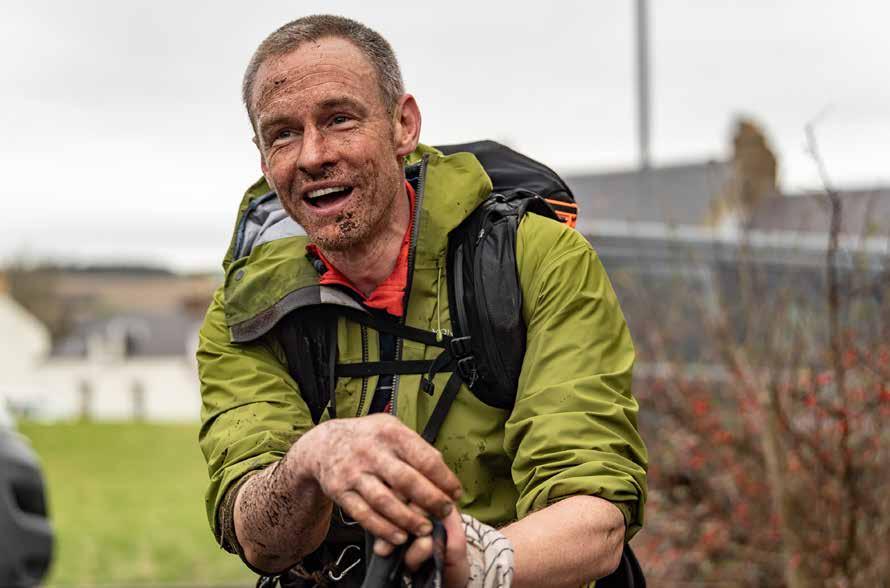
When he’s not busy leading GFW, Forum member Richard Garland is pushing his limits in extreme endurance races. Forum checks in to discuss how he prepared for the Montane Winter Spine Race, the challenges he faced and what’s next…
For most people, a long weekend might involve a city break, a few rounds of golf, or catching up on much-needed rest. But for Richard Garland, Managing Partner at GFW (formerly George F White) a January winter break meant tackling one of the world's toughest endurance races - the Montane Winter Spine Race. Known as Britain’s most brutal endurance challenge, The Montane Winter Spine Race spans 268 miles along the Pennine Way from Edale in Derbyshire to Kirk Yetholm in the Scottish Borders. With a 168-hour
time limit, runners battle extreme winter conditions, tackling over 10,000 metres of ascent across demanding landscapes, including the Peak District, Yorkshire Dales, and the Cheviots. Limited to just 150 participants, the race pushes both physical and mental endurance to the limit, with temperatures plunging as low as -10°C and only eight hours of daylight per day. It’s safe to say it’s not for the faint-hearted, and certainly not what you’d expect from a busy entrepreneur’s downtime. Richard is no stranger to pushing
himself. As a managing partner of a leading property consultancy firm, he thrives in high-pressure situations, but even he admits that the Spine Race was an entirely different beast. “It’s an endurance event like no other,” he says. “It’s not just about fitness, it’s about mental resilience, problem-solving, and managing yourself in extreme conditions.”
Richard didn’t just suddenly leap into extreme endurance racing; it was a gradual evolution from a casual love of the outdoors. “I probably started running about 10 years ago,” he
recalls. “I was getting a little unfit in my mid-30s. I’ve always loved being outside, particularly in the hills, so running just became an extension of that.” His initial journey into running was modest, but he quickly found himself drawn to fell running - offroad races that embrace the rugged landscapes of the UK.
As he got older, he found that while he wasn’t as competitive in shorter, high-intensity races, he thrived in endurance events.
“Ironically, you get more endurance as you age,” he explains. “I’ve always been curious about where my limits are, so I started doing longer and longer races.”
The Montane Winter Spine Race, however, had been on his radar long before he decided to enter. “I first walked the Pennine Way with my wife 20 years ago, and it’s a really special place to me. When the Spine Race started, we followed it online thinking, ‘This is mad!’ But a few years ago, my own running and my fascination with the race just clicked together. I thought, ‘I might actually have a go at that.’”
Training for the challenge was no
small feat, but Richard’s experience was particularly unconventional.
Unlike most competitors, who spend the better part of a year preparing, Richard only found out he had secured a place in late Novemberjust six weeks before the race. “That had its challenges physically,” he admits, “but mentally, it was probably better. I didn’t have a whole year to stress about it.”
In the short window he had to train, his focus was on adapting to the sheer physical strain of running with the mandatory 10-kilo race pack. “That weight has a huge impact on how you run,” he explains. “So my goal was to run as many miles as possible with the bag on.” Beyond that, he leaned on experience, knowing that some challenges, such as extreme fatigue and foot deterioration, could never be fully prepared for. “You just have to get through it,” he says matter-of-factly.
The Montane Winter Spine Race is notorious for its brutality, and Richard’s experience was no exception. “Conditions underfoot were terrible,” he recalls. “It started with deep snow and ice in the Peak District, then we had a massive rainstorm through the Dales. Half the runners dropped out that night. The snow and ice melted into slush, and for three days, our feet were underwater in bogs. That kind of thing you can never fully prepare for.” As well as being physically demanding, there’s a whole other level of difficulty that comes with the mental side of the race. “The race hits you on every level,” he says. “It’s dark 15 hours a day, it’s cold, foggy, misty, wet and you’re delirious from lack of sleep. There was a particular moment where I felt extremely tired, hungry and I just felt a bit down and emotional. Nothing in particular had happened; it was just a combination of things that made me feel rubbish and I felt myself getting annoyed and negative. You’re trying to survive in such dreadful conditions, it’s only natural to want to give up,” he explains.
So, what kept him going? “Quitting was never an option,” Richard says. “I’ve finished shorter races with broken ankles and a shattered kneecap. I’m just quite stubborn. I just remember thinking if you can run one more step, you can run a mile, and if you run one more mile, you can run 10 and if you run 10, you can get

It’s an endurance event like no other. It’s not just about fitness, it’s about mental resilience, problem-solving, and managing yourself in extreme conditions.
to the checkpoint and recover.”
But there were highs, too. “Every time the sun came up, it was amazing,” he says. “One moment that stood out was the sprint finish at the end with a friend. Probably a little silly, probably irresponsible, but great fun. And then there was the scenery. Seeing the sun rise over High Cup Nick, the mist clearing from Cross Fell with views to the Lake District… moments like that take your breath away.”
Beyond the physical challenge, Richard had a deeply personal motivation for taking part. “Last year, my mum was diagnosed with Progressive Supranuclear Palsy (PSP),” he explains. “It’s similar to Parkinson’s but more aggressive and much less understood.” The race was his way to raise awareness and funds for the PSP Association. “The disease is rare and complicated, and even in the medical profession, there’s a lack of understanding. The PSP Association has been a huge support to us, so I wanted to give something back.” His efforts raised over £3,000. Between his responsibilities at GFW, family life, and training for one of the world’s toughest races, Richard had to be strategic with his time. “A lot of
my training was at night,” he says. “Once you realise you can run in the dark with a head torch, it actually becomes quite liberating.” He also found ways to blend running with family time. “Emma and the kids have been hugely supportive. We’d go out walking together as a family, or even for a drive and they’d drop me off somewhere, and I’d have to run 15-20 miles home.” It also helped that he’s used to making time for adventure. “Spending time with my family is my priority. My kids love adventure too and our summer holiday last year was walking the 100-mile Tour du Mont Blanc.”
Crossing the finish line after five days of relentless running was both a triumph and a strange re-entry into reality. “You go from having five days with no emails, no calls, no responsibilities, just moving from A to B - they call it the ‘Spine Bubble’, to suddenly being back in the real world,” he says. “It’s a strange adjustment.”
And while the sense of achievement has sunk in, Richard has no immediate plans for another extreme challenge. “Right now, I’m enjoying catching up on four- or five-years’ worth of jobs around the house,” he laughs. “I’ll do some local fell races, but I think I need a bit of recovery time before I dream up something else.”
For now, Richard is back in the office, leading GFW through its next chapter. But if the Spine Race has taught him anything, it’s that pushing limits, whether in business or daily life, is where true growth happens. “You don’t realise what you’re capable of until you step out of your comfort zone,” he says.
To donate to The PSP Association visit Richard’s JustGiving page:

Elite basketball players from across Europe - including Paris Olympians - are preparing for life beyond the court by studying a newly designed Postgraduate Business and Management course, focusing on Leadership and the Business of Sport, at Northumbria University in Newcastle.
The players are taking part in FIBA Europe’s TIME-OUT 3.0 education programme that helps professional basketball players build careers when they retire from the sport. FIBA Europe, the European office of the Basketball World Governing body FIBA, has been working in partnership with Northumbria’s Newcastle Business School to deliver the programme since it was launched in 2017.
This year’s cohort of 44 students from
28 different nationalities includes recent Paris Olympic medallists
Valeriane Ayayi of France, Netherlands' Arvin Slagter and Vega Gimeno of Spain. They will aim to follow on from the 128 previous participants that have successfully completed the programme previously - combining their basketball careers with studying for a Postgraduate Certificate in Business and Management.
FIBA Europe President Jorge
Garbajosa and FIBA Executive Director Europe Kamil Novak, who collaborated with Radmila Turner, FIBA’s Head of National Federations & Sport and Anti-Doping/Europe, and Vince Robson, Northumbria University Business Development Manager, to design the programme, have spoken about the significant impact of TIME-OUT on the lives of professional basketball players.
“The TIME-OUT programme ensures that the skills and experiences gained as athletes are not just left behind but
are carried forward into new careers and opportunities,” commented Mr Garbajosa.
“As someone who transitioned from the court to a new role in leadership, I understand the challenges that come with this change – and I'm sure that TIME-OUT will help with this transition,” explained Mr Novak.
Vincent Robson, Business Development Manager at Northumbria, added: “Partnering with an organisation like FIBA Europe and working with some of Europe’s top professional basketball stars, some of whom have just represented their country and won Gold Medals in the Paris Olympics or European Championships and play in top European leagues, is hugely prestigious. Northumbria has worked closely with FIBA to design effective and flexible academic courses that offer enhanced career opportunities to as many elite players as possible across Europe. The success of TIME-OUT and the positive outcomes for students reflects the strength of continuing professional development courses that we run at Northumbria with our partners.”
In a world where change is constant, keeping pace with new trends and acquiring the latest skills and knowledge gives businesses and their employees a competitive edge. Northumbria University offers a wide range of accredited and nonaccredited short courses, specialist training, and Continuing Professional Development (CPD) programmes.
Named Modern University of the Year 2025 by The Sunday Times Good University Guide, Northumbria University continues to demonstrate its commitment to social mobility through various initiatives, including its successful partnership with FIBA Europe.
To learn more about Northumbria University's specialist training and development programmes for both organisations and individuals, visit
In
the world of university spinouts, ground-breaking research is
just the beginning. A significant challenge lies in
translating pioneering ideas into scalable businesses.
Strong management teams, experienced in commercialisation, are vital for success. That’s where Northern Accelerator’s Executives into Business programme and Spinout Leaders’ Network step in. Northern Accelerator is a partnership of the North East’s universities –Durham, Newcastle, Northumbria, Sunderland and Teesside, together with University of York – to transform the region’s most innovative research into real-world impact. A crucial part of this support is bringing experienced business leaders into fledgling university spinouts, equipping them with the commercial acumen needed to secure investment, scale operations, and succeed in competitive markets.
Executives into Business programme actively recruits seasoned professionals, entrepreneurs, business leaders, and industry specialists, matching them with emerging commercial opportunities. This ensures that academic founders are supported by individuals with proven commercial expertise, helping bridge the gap between cutting-edge research and market-ready businesses.
Through this initiative, the North East’s innovation ecosystem is strengthened, with investors gaining confidence in spinouts that are led by robust, commercially focused teams. The programme has already contributed to over 50 success stories, including Newcastle University’s AMLo Biosciences and Durham’s Nascent Semiconductor.
For experienced business leaders looking to take on an executive role in a high-potential startup, Northern Accelerator offers the opportunity to join the Executive Pool. This allows professionals with relevant expertise to register their interest in becoming a future spinout leader, ensuring a steady pipeline of commercial talent for the region’s most promising university ventures.
With over 50 businesses created so far, Northern Accelerator is fostering peer-to-peer engagement and providing vital support for spinout company founders. A new Spinout Leaders’ Network brings together leaders from across the North East’s thriving innovation ecosystem, offering monthly events where they can share experiences, tackle challenges, and build valuable connections. Sessions feature expert speakers covering key topics - from attracting talent to securing funding - ensuring that spinout leaders have access to the insights and guidance they need as part of a strong community.
Northern Accelerator is ensuring that innovation in the North East doesn’t stay in universities, but reaches the wider world as thriving, scalable businesses.
For investors, this means greater confidence in backing university spinouts. For founders, it means access to a talent pool of seasoned professionals who can help navigate the complexities of commercialisation. And for the North East as a whole, it means a stronger, more dynamic ecosystem where world-class research translates into economic growth and job creation.
As Northern Accelerator continues to support more spinouts, the region is cementing its reputation as a powerhouse for innovation. With the right leadership in place, the North East’s university-born businesses are not just competing on a national stage — they’re making an impact globally.
Prior to spinning out, potential academic founders are supported to develop crucial business skills through an in-depth training programme. Professors Simon Gilbody and Dean McMillan, founders of ThirdAge TX from the University of York, have benefitted from the Future Founders training programme as well as the Spinout Leaders’ Network. Dean said: “It’s taken us from being curious about spinouts to being able to set up a viable business, articulate what we do and pitch for investment.
“If we’d carried on thinking like academics in a start-up environment, we wouldn’t have got far but we’ve learned a new language, a new way of thinking and identified lots of transferable skills.”




Northern Accelerator is funded by Research England’s Connecting Capability Fund and the UK Government through the UK Shared Prosperity Fund, supported by North of Tyne Combined Authority and Durham County Council.
To find out more about Northern Accelerator and to register your interest as a potential Executive into Business, visit
From groundbreaking business expansions to impressive investments and exciting new launches, our members are driving growth and shaping the future of the region. Here’s all the latest news you won’t want to miss! For more member news and insights: entrepreneursforum.net/news
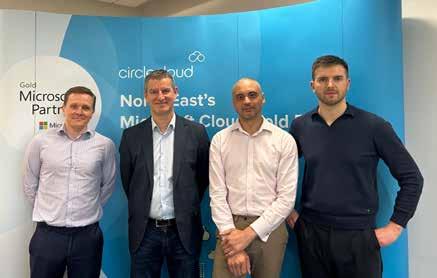
Teesside IT firm enjoys strong year of growth
An IT provider is celebrating a year of growth as demand for managed IT support and cybersecurity services grows. Circle Cloud, headquartered in Stockton’s Fusion Hive, saw contracted revenues rise by more than 20 per cent in 2024.

Teesside firm creating new jobs thanks to six-figure grant and programme backing
Workplace wellbeing software firm OptiMe is creating 10 new jobs and is eyeing further growth thanks to more than £100,000 grant funding from the Tees Valley Combined Authority and its Forge programme.

Prima Cheese to make multi million-pound investment
Prima Cheese, a North East family firm supplying cheese across the world, said it is making multimillion investments into the business over the next two years to cement its position as a UK leader.
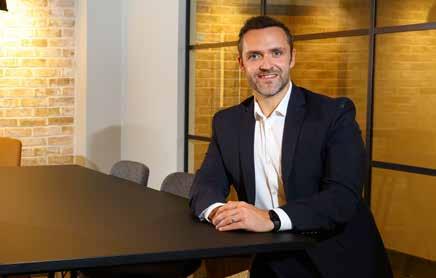
Teesside firm secures £500K NPIF II funding
Fast growth continues for Wade Construction Management Consultants after receiving a £500k investment from NPIF II – FW Capital Debt Finance, which is managed by FW Capital as part of the Northern Powerhouse Investment Fund II (NPIF II).
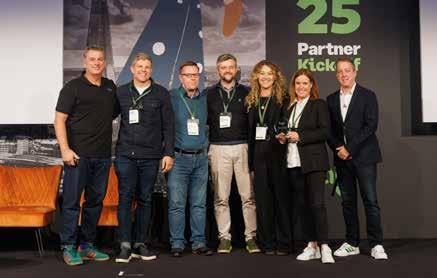
Tech firm ION celebrates “transformative year”
A Newcastle-based technology company that is “helping shape the future of education finance” is celebrating a landmark year after securing £5.5 million in new contract sales.
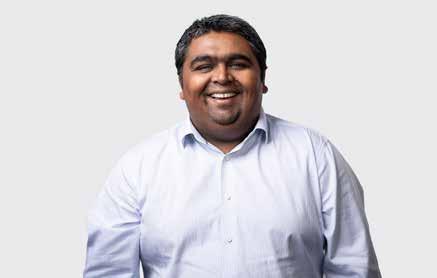
Hedgehog lab expands after record growth
A North East based digital consultancy is expanding following its strongest sales quarter in nearly two decades. hedgehog lab has marked a “significant milestone” by opening a new hub in Leeds as part of its ambitious growth strategy.

Recruitment drive at North East research agency to aid growth ambitions
National market research agency Explain, based in Newcastle upon Tyne, has announced a recruitment drive following major growth over the past 12 months and to aid ambitious targets for 2025/26.
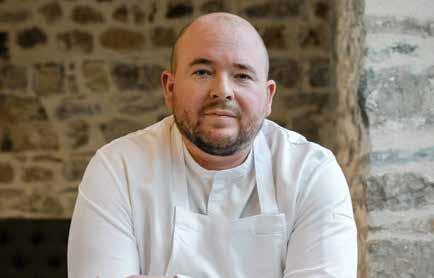
Middleton Lodge’s
A North Yorkshire fine dining restaurant is celebrating after being awarded a Michelin Star. Forge, based at Middleton Lodge Estate, received the prestigious honour at the Michelin Guide Ceremony for Great Britain and Ireland.

Kayleigh Laverick, founder of Mamma Social Co, has been honoured with the 2025 Northern Power Women Awards: Person with Purpose for her outstanding commitment to tackling perinatal isolation and transforming maternal mental health support across the UK.

MySalesCoach takes coaching platform to the next level with Northstar Ventures investment
The highly effective sales coaching platform developed by MySalesCoach has netted the company a further £935,000 of investment from Northstar Ventures as part of a £1.1m funding boost.
When Raman Sehgal - founder of ramarketing and EF's Scale-up Leaders' Academy alumni - first set his sights on expanding his venture beyond the UK, it wasn't just a business move, it was a calculated leap of ambition.

Founded in his Gateshead bedroom in 2009, the pharmaceutical and life sciences marketing agency had already carved out a solid reputation in the UK market. In 2015, it was time to transform it into a transatlantic powerhouse - and Boston was the natural first choice destination.
“The US is the biggest market in the world, and Boston is the hub of modern drug development,” Raman explains. “If you want a real foothold in the pharmaceutical and biotech space, you need to be where the action is.”
Raman’s transatlantic journey began on a trade mission with the Department for International Trade (DiT). This trip opened Raman’s eyes to the vast potential of the US market and, inspired by the opportunities available, ramarketing launched its Boston office in 2018, marking the start of its North American adventure.
With a growing client base concentrated on the East Coast and promising leads brewing, the location represented more than just a new office - it was a footing in the epicentre of pharmaceutical innovation. Recognising the importance of founder presence, Raman made the bold decision to relocate himself and his family from
Newcastle to Boston rather than attempting to manage the expansion remotely. “By having a presence in Boston, we became the real deal and a genuine option for US clients overnight.” Raman recalls.
At the time, the pharmaceutical outsourcing sector was experiencing rapid growth. Ramarkerting arrived with a fresh perspective and reputation for cutting-edge, sectorspecific marketing knowhow.
After solidifying its place in Boston, the company quickly realised that to scale successfully, it needed to be more than just a physical presence: it needed a committed, global approach - starting with the right team.
“Post-COVID, hiring in Boston became incredibly expensive,” Raman recalls. “We knew we needed to further expand our North American presence and Toronto emerged as the perfect solution with respect to talent.”
In 2023, ramarketing headed North across the border and expanded into the Canadian market by opening its Toronto office. This move offered a wealth of diverse, highly skilled talent and a stable employment market. Once again, the Sehgal family were on the move, relocating to Canada
after a short stint back in the UK, with Raman applying his first-hand knowledge that being on the ground was crucial to successfully establishing a new office.
As one of the most multicultural cities in the world, Toronto also reflected the company’s commitment to building a globally-minded business.
Beyond that, Toronto provided solid access to North American clients without the heavy costs associated with major US cities like New York and San Francisco.
Expanding across borders isn’t easy and Raman was clear-eyed about the challenges. One of the biggest lessons he learned was the importance of speaking to those who’ve been through it before. “We developed a template of questions and spoke to advisors across legal, accounting and immigration,” he recalls. “The information is out there if you know where to look.”
Raman reflects on how today's entrepreneurs have an advantage, with access to emerging technologies such as AI tools like ChatGPT that can demystify complex processes, but even with cutting-edge resources, the human touch remains essential.
“You need good advisors who understand the nuances,” he says.
“Each location has its quirks. It's not for the faint-hearted - it costs a lot and adds significant overhead.
But if the benefits outweigh the costs, it's worth every penny.
“Once you know you can do it, expansion becomes easier,” Raman shares. “We even relocated some of our UK colleagues to North America. Offering that kind of mobility boosts talent retention and strengthens the business.”
Cultural differences across North America also played a significant role in shaping ramarketing’s approach.
Raman notes the stark contrast between the East Coast and West Coast, or the US and Canada.
“Ontario, Canada, has more of a Midwest feel to me, more priceconscious, friendlier, and laid back.” he explains, but by understanding these regional differences, ramarketing could better connect with its US clients who, Raman notes, value proximity.
“Our North American clients value us being in the right time zone and working in local currencies,” Raman says. “In an age of rising economic nationalism, having an ‘American’ or ‘Canadian’ presence gives you a significant edge. Being physically present in the market reassures clients that you understand their needs.”
The success in Boston gave ramarketing the confidence to replicate that success in Toronto and beyond. Now, with North America making up 50% of its revenue, the agency’s ambitions show no signs of slowing down. Raman’s ultimate goal for ramarketing is clear: to be the growth agency in the global B2B pharma services space, and looking ahead, his ambitions remain global. While North America is the current focus, Raman sees potential in the Asian markets - not to directly service those regions, but to support clients with interests in the US and Europe.
For both Raman and ramarketing, the leap across the Atlantic wasn’t just a growth strategy, it was a defining move that reshaped the business, and for other entrepreneurs bold enough to follow in his footsteps, the rewards can be just as transformative. “If you’re going to do it, I’d say don’t mess about,” Raman advises, adding, “Either you’re committed or you’re not. If that means moving, spending the money and doing the heavy lifting, then do it. Clients can smell BS a mile off. If you claim to be in the market but aren’t truly invested, it won’t work.”
For Raman, the success of ramarketing’s expansion lies in commitment, strategic planning and the willingness to invest in the long game. “Once you’re in, you need to stay all in,” he says, “and the results will follow.”
